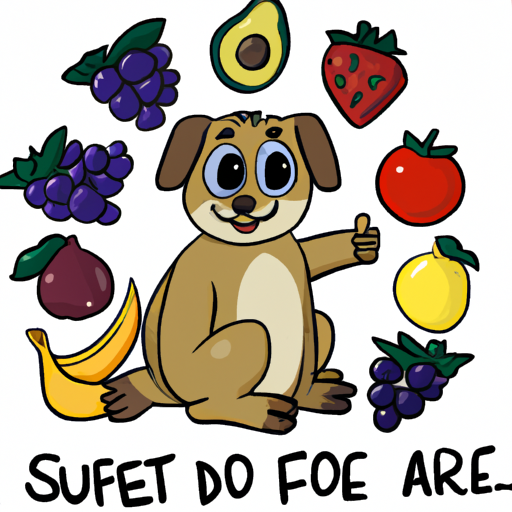Dogs are more than just pets; they’re family. As a caregiver, you understand the importance of keeping your furry family members healthy and happy. And just like humans, dogs also need a balanced diet to maintain their overall health. While their main diet should consist of high-quality commercial dog food, sharing some fruits with your dog can provide extra vitamins and minerals to their diet, enhancing their health.
While some fruits are safe for dogs to eat, others can be harmful. Therefore, it is crucial to know which fruits are safe and beneficial for dogs and which ones should be avoided.
Table of Contents
- Safe Fruits for Dogs
- Fruits to Avoid
- Health Benefits of Fruits for Dogs
- FAQs
- Conclusion
Key Takeaways
- Not all fruits are safe for dogs to eat.
- Some fruits, like grapes and avocados, can be harmful to dogs.
- The fruits safe for dogs offer numerous health benefits.
- Always introduce new foods to your dog’s diet gradually.
Safe Fruits for Dogs
Certain fruits can provide a healthy addition to your dog’s diet. Here are some safe options:
-
Apples: Apples are a great source of vitamins A and C, which can help to strengthen your dog’s immune system. Just make sure to remove the seeds and core first, as they can be a choking hazard.
-
Bananas: These are an excellent source of potassium and vitamins. They’re also high in sugar, so they should be given in moderation.
-
Blueberries: Known as a superfood, blueberries are packed with antioxidants that can benefit your dog’s health.
-
Cantaloupe: This fruit is rich in vitamins A and C, and is safe for dogs when served in small, bite-sized pieces.
-
Oranges: Oranges are safe for dogs in small quantities. They are high in vitamin C but also high in sugar.
Remember to introduce these fruits gradually into your dog’s diet to prevent digestive upset.
Here’s a comprehensive list of safe fruits for dogs
Fruits to Avoid
While some fruits are beneficial for dogs, others can be toxic. Here are some fruits you should never feed your dog:
-
Grapes and Raisins: These can cause kidney failure in dogs.
-
Avocados: They contain persin, which can be toxic to dogs.
-
Cherries: The pits, stems, and leaves contain cyanide, which is poisonous to dogs.
-
Citrus Fruits: While the flesh of citrus fruits is safe, the peels, seeds, and leaves can be toxic.
-
Tomatoes: The green parts of the tomato plant contain solanine, which is toxic to dogs.
Always keep these fruits out of your dog’s reach to prevent accidental ingestion.
Here’s a more detailed list of fruits to avoid
Health Benefits of Fruits for Dogs
Fruits can provide significant health benefits to your dog. They are low in fat and high in fiber, vitamins, and minerals. They can help boost your dog’s immune system, improve digestion, and reduce inflammation.
For more about the health benefits of fruit for dogs, check this article.
FAQs
1. Can Dogs Eat Fruits Every Day?
Yes, dogs can eat certain fruits every day, but in moderation. Always remember that fruits should not replace a balanced diet for your dog.
2. Are Canned Fruits Safe for Dogs?
No, canned fruits are not recommended for dogs as they often contain high levels of sugar or artificial sweeteners like xylitol, which is toxic to dogs.
3. How Should I Feed Fruits to My Dog?
Always wash fruits thoroughly to remove any pesticides, cut them into small, manageable pieces to prevent choking, and remove any seeds or pits.
Conclusion
As a caregiver, knowing what fruits are safe for your dog to eat can help you provide a more varied and nutritious diet for your pet. Always remember to introduce new foods gradually and watch for any signs of allergies or digestive upset. And when in doubt, always consult with your vet.
For more information on what fruits are safe for dogs, you can visit One Top Dog. They have a wide range of articles on dog nutrition, including a detailed guide on what foods are safe for dogs and a comprehensive list of toxic foods for dogs.



